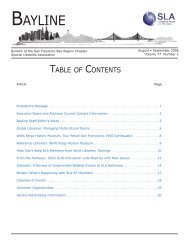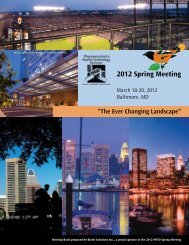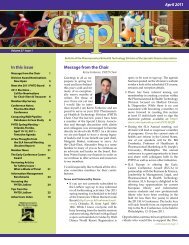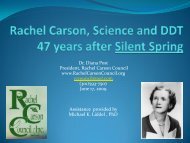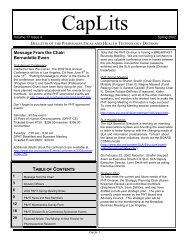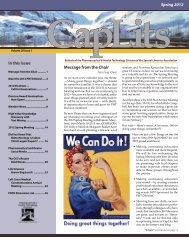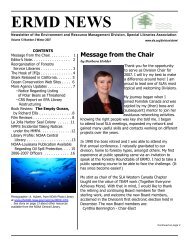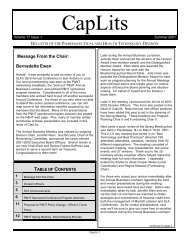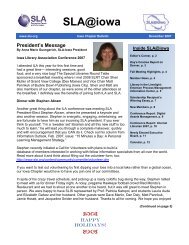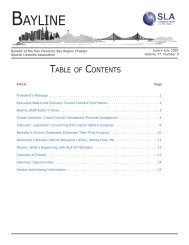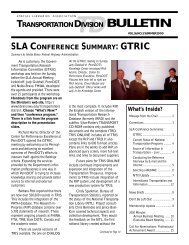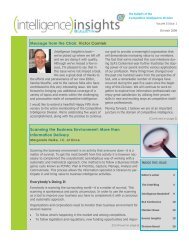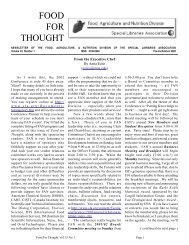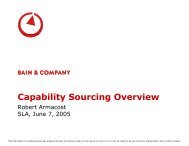Education Libraries - Special Libraries Association
Education Libraries - Special Libraries Association
Education Libraries - Special Libraries Association
Create successful ePaper yourself
Turn your PDF publications into a flip-book with our unique Google optimized e-Paper software.
Resources on the Net<br />
Survey Research<br />
Kenney, A., Entlich, R., Hirtle, B., McGovern, N.,<br />
and Buckley, E. (2006, September). E-Journal<br />
archiving metes and bounds: A survey of the<br />
landscape. Retrieved September 30, 2008, from<br />
the Council on Library and Information<br />
Resources website:<br />
http://www.clir.org/pubs/reports/pub138/pub138.pdf<br />
The authors present the findings of a large scale<br />
survey that they conducted on 12 e-journal<br />
archiving programs. The survey grew out of<br />
academic libraries’ increasing awareness of the<br />
problems in e-journal archiving, although “<br />
many are unclear on the dimensions of the<br />
problem, the alternatives for action, and what<br />
role they might play.” Academic libraries must<br />
support the development of viable, collaborative<br />
e-journal archiving initiatives in order to better<br />
service their respective user communities. The<br />
report includes a number of recommendations<br />
for academic libraries, for publishers, and for ejournal<br />
archiving programs.<br />
Markey, K., Rieh, S., St. Jean, B., Jihyun, K., and<br />
Yakel, E. (2007, February). Census of<br />
institutional repositories in the United States:<br />
MIRACLE project research findings. Retrieved<br />
September 30, 2008, from the Council on<br />
Library and Information Resources website:<br />
http://www.clir.org/pubs/reports/pub140/contents.html<br />
The authors report on the results of a nationwide<br />
census of institutional repositories in U.S. academic<br />
institutions. Institutional repositories developed out<br />
of the need to address the challenges posed by<br />
digital scholarship and its organization,<br />
accessibility, and preservation. Institutional<br />
repositories require considerable investment, and<br />
Resources on the Net –<br />
Current Issues in Digital <strong>Libraries</strong><br />
Compiled by Chris Bober<br />
rather than work in isolation, the authors believe<br />
that “it would be helpful if academic institutions<br />
could learn from one another, sharing their<br />
experiences, building models, and formulating best<br />
practices.”<br />
Smith, K. (2008, Winter). Institutional repositories<br />
and e-journal archiving: What are we learning?<br />
Journal of Electronic Publishing. Retrieved<br />
September 30, 2008, from<br />
http://hdl.handle.net/2027/spo.3336451.0011.107<br />
Smith provides a critical evaluation of the two<br />
above-mentioned surveys on e-journal archives and<br />
on institutional repositories. Both organizational<br />
models have their respective strengths and<br />
weaknesses. The surveys demonstrated that,<br />
regardless of the organizational model that is<br />
selected for digital archiving, they must have the<br />
active support and involvement of stakeholders if<br />
they are to evolve and succeed. Progress has been<br />
made but there are still challenges ahead “including<br />
those of refining missions, balancing stakeholder<br />
benefits, and building trust. Meeting these<br />
challenges is essential to the future of scholarly<br />
communication.”<br />
Selected National and International Initiatives<br />
Archive-It. (n.d.). Retrieved September 15, 2008,<br />
from http://www.archive-it.org/<br />
Archive-It was launched in 1996 by the Internet<br />
Archive in order to assist institutions which were<br />
exploring ways of archiving their Internet content.<br />
<strong>Education</strong> <strong>Libraries</strong>, Volume 31, No. 2, Winter 2008 69



